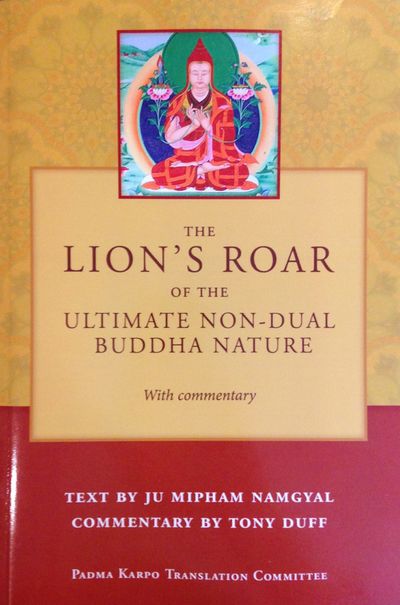
The teaching of the Buddha hinges around the one point that sentient beings, meaning beings having a mind, have within them the potential to become a buddha. If they did not possess that potential, it would not be possible for them to become buddhas and the rest of the Buddhist teaching would be an interesting but useless philosophy. Therefore, the topic of buddha nature is especially important.
The Buddha taught buddha nature in three steps, each more profound than the previous one. The last step is regarded by most Tibetan Buddhist schools as the most profound teaching of the sutras, the very essence of what the Buddha was trying to communicate to his followers. It is the same teaching as found in Mahamudra and Dzogchen, so is important for all Buddhists to understand, but especially for those who are studying the Mahamudra and Dzogchen teachings.
The very learned Nyingma teacher Ju Mipham Namgyal gave a teaching that clearly showed this ultimate non-dual buddha nature. It was recorded and published by his students in a text called The Lion's Roar that is A Great Thousand Doses of Sugatagarbha which forms the basis of this book. The text needs clarification, so a very extensive explanation has been provided by the author of the book, the well known Western Buddhist teacher and translator, Tony Duff. As with all of our books, and an extensive introduction, glossary, and so on are provided to assist the reader.
- The Lion's Roar That is a Great Thousand Doses of the Sugata Essence by Ju
Mipham Namgyal1
- Posing the Question5
- Giving the Answer5
- The presentations of other traditions6
- The first reason6
- The second reason6
- Stating our own tradition10
- The first reason10
- The ordinary way10
- The extraordinary way11
- The second reason17
- The third reason20
- Dispensing with some mistaken positions26
- The element in being not empty being truly established27
- The element in being a cut-off empty condition28
- Wisdom in being impermanent being compounded30
- A Thorough Commentary to the Lion's Roar That Is a Great Thousand Doses of
the Sugata Essence by Tony Duff45
- Introduction47
- The vocabulary of buddha nature–garbha, dhātu, gotra, potential, seed of a
buddha, sugata essence and tathāgata essence; the importance of the teaching on sugata essence
- The Text: Prefatory section57
- The title; the prostration; the expression of worship
- The Text: Body of the text62
- Introduction, the need to establish sugata essence using scripture and reasoning;
posing the question, giving the answer; the presentations of other traditions;
presenting the positions of early Tibetans; refuting the positions of early Tibetans;
the first reason; the second reason; stating our own tradition; the first reason; the ordinary way; the extraordinary way; the second reason; the third reason;
dispensing with some mistaken positions; dispensing with the view that the element being not empty is truly established; dispensing with the view that the element is a cut-off empty condition; dispensing with wisdom in being impermanent taken to be compounded
- The Text: Concluding section and colophons156
- Texts Cited169
- Glossary of Terms173
- Supports for Study193
- Tibetan Text199
- Index229
Mi pham rgya mtsho. བདེ་གཤེགས་སྙིང་པོའི་སྟོང་ཐུན་ཆེན་མོ་སེངྒེའི་ང་རོ།, (
Bde gshegs snying po'i stong thun chen mo seng+ge'i nga ro).
- In Gsung 'bum/ Mi pham rgya mtsho: The expanded redaction of the complete works of collected writings of the famed Nyingma polymath, Jamgon Ju Mipam Gyatso, Vol. 4: 563-608. Paro, Bhutan: Lama Ngodrup and Sherab Drimey, 1984-1993.

- In Bka' ma shin tu rgyas pa (kaH thog), Vol. 49: 367-432. Chengdu: KaH thog mkhan po 'jam dbyangs, 1999.

- In Stong thun seng+ge'i nga ro. Bylakuppe: Ngagyur Nyingma Institute, 2002.

- In Mi pham bka' 'bum, Vol 15: 173-218. Khreng tu'u: Gangs can rig gzhung dpe rnying myur skyobs lhan tshogs, 2007.

- In Mi pham gsung 'bum las gzhung 'grel skor, Vol. 17: 131-164. Khreng tu'u: 'Jam dpal d+hI yig ser po'i dpe skrun tshogs pa, 2008


